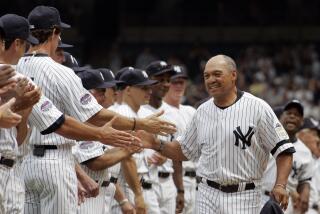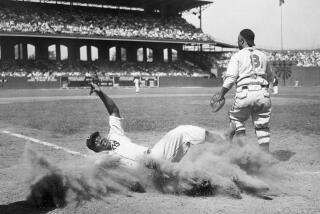Commentary : Today, He Is News, but Someday . . .
- Share via
Someday, it won’t be news when a black baseball manager is hired. But not just yet.
When Cito Gaston took over the Toronto Blue Jays full time Wednesday, he became the fourth black manager -- ever. In the 20 years since Martin Luther King Jr. died, just four. In the 40 years since Jackie Robinson blazed the trail, just four. In over 100 years as our national pastime, just four.
And while we applaud baseball for moving forward (working on the longest-journey, single-step theory), we do not applaud too loudly. There is too far yet to go.
For his part, Gaston says the fact of his race should not be overplayed, but we wonder if it can be.
Race remains a central issue in sports, perhaps its most important outside, as they say in baseball, the white lines. Certainly, this can be traced to the visibility factor. Unlike real life, all the players are there before us, and many people, for different reasons, are counting.
They count no black head football coaches in the National Football League, no black general managers and one black quarterback ever to have played in the Super Bowl. Others insist on counting how many white players a black coach, John Thompson, has recruited at Georgetown.
The Boston Celtics, whose history of employing blacks is fairly exemplary, unwittingly become much of White America’s team simply because they happen to have an unusual number of white players in a mostly black league.
It seems everyone is counting. On NBC-TV, Tom Brokaw, the news anchor, hosts an hourlong show exploring the physical differences between white and black athletes, suggesting, finally, that black superiority in some disciplines may have its roots in a greater concentration of fast-twitch muscles. All the while we wonder how NBC can give over an hour of its news time to a topic of so little news value.
The issue of race in sports hit home very hard recently when the University of Maryland fired Bob Wade as its basketball coach. Many in the black community rushed to support Wade, in some cases blindly. Much more disturbing, though, was what I saw as an angry backlash in some parts of the white community to this black solidarity.
If the decision on Wade was, as I continue to believe, race-neutral, that does not discount the painful truth that Wade was the only black head coach of a basketball or football team in the history of the Atlantic Coast Conference. Can you suggest an explanation for this state of affairs that does not include racism as a factor?
So, against all odds, Gaston is hired to manage the Blue Jays. Progress is made, and in some corners hailed. The new commissioner, Bart Giammati, sends along his congratulations. But what does it mean?
I fear it means very little. As a sports columnist, I sometimes wonder if we pay too much attention to racial injustice in the sporting world. My concern is that by narrowing the focus, it leaves us free to ignore racism at large. Do we worry too much about how many black coaches are in the ACC and not enough about declining black enrollment in colleges and universities across America?
And yet, sports are often seen as a microcosm of our society, and I’m sure there is truth in that. How many people have been more important to the cause of civil rights in this country than Jackie Robinson? When he crossed a white line, it became easier for others.
In Joe Louis and Jesse Owens, America found black heroes that white children could look up to. That mattered. Today, Michael Jordan graces the cover of a cereal box that was once closed to blacks. That matters, too. But what’s the prevailing message -- that blacks, if they have enough fast-twitch muscles, can succeed as athletes?
The Blue Jays made a reasonable choice, elevating Gaston, who had been the interim manager. They made that decision after being in contact with Clifford Alexander, who advises the commissioner on minority hirings.
If Gaston was white, it would have been pretty much business as usual. But because he is black, we take notice. Someday, it won’t be that way. Someday, commissioners won’t have to send along congratulations steeped in the language of social justice. Someday, the counters will have lost track. But not just yet.
More to Read
Go beyond the scoreboard
Get the latest on L.A.'s teams in the daily Sports Report newsletter.
You may occasionally receive promotional content from the Los Angeles Times.










